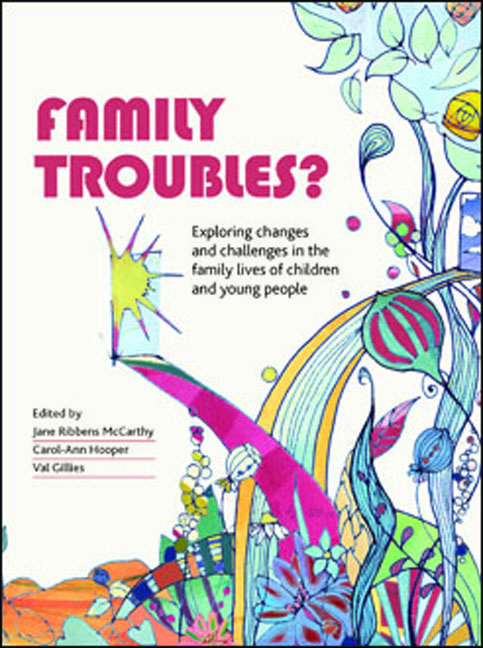Book contents
- Frontmatter
- Contents
- Notes on contributors
- Foreword
- Preface
- 1 Troubling normalities and normal family troubles: diversities, experiences and tensions
- Part One Approaching family troubles ? Contexts and methodologies :Introduction to Part One
- Part Two Whose trouble ? Conteste d definitions and practice: Introduction to Part Two
- Part Three The Normal, The Troubling And The Harmful?: Introduction to Part Three
- Part Four Troubles and transitions across space and culture: Introduction to Part Four
- Part Five Working With Families: Introduction to Part Five
- Index
26 - What is at stake in family troubles? Existential issues and value frameworks
Published online by Cambridge University Press: 07 September 2022
- Frontmatter
- Contents
- Notes on contributors
- Foreword
- Preface
- 1 Troubling normalities and normal family troubles: diversities, experiences and tensions
- Part One Approaching family troubles ? Contexts and methodologies :Introduction to Part One
- Part Two Whose trouble ? Conteste d definitions and practice: Introduction to Part Two
- Part Three The Normal, The Troubling And The Harmful?: Introduction to Part Three
- Part Four Troubles and transitions across space and culture: Introduction to Part Four
- Part Five Working With Families: Introduction to Part Five
- Index
Summary
Introduction
Wherever one looks on the globe it appears that human beings want to be edified by their miseries. It is as if the desire to make suffering intelligible and to turn it to some advantage is one of those dignifying peculiarities of our species.… Human beings, unlike other living things, want to … make their suffering intelligible, even as it is unwanted. (Shweder et al, 1997, p 119)
In this chapter, I ask the question of what is at stake in family troubles, and highlight some key themes in responding, including: the moral issues of family living and the care of children; existential issues of shared and variable human experiences of troubles and suffering in relational lives and the challenges these pose, particularly in relation to children; and cultural resources for dealing with such experiences. And I further consider what help is available from philosophers and social scientists for establishing any frameworks or guiding principles that can avoid a nihilistic form of cultural relativism in defining family troubles, while remaining sensitive to the diversities, ambiguities and complexities of the family lives of children and young people in variable contexts. In this discussion, I seek to keep in mind how children and young people actively construct meanings through which to make sense of their everyday interactions and circumstances, but I also reflect on how adults and social institutions shape the meanings of troubles in children's family lives and the sorts of resources young people can marshal in order to make sense of such troubles, and seek some degree of intelligibility in the process.
In considering the question of whether, and how far, troubles may be seen as a ‘normal’ part of children's changing family lives, we might consider how troubles may come, for example, in the form of unwelcome changes and challenges (or their absence), but also in the context of welcome changes that may nevertheless pose challenges to previous daily normalities, and thus entail some degree or form of loss (for consideration of the complexities of understanding changes in children's family lives, see Ribbens McCarthy et al, Chapter One).
- Type
- Chapter
- Information
- Family Troubles?Exploring Changes and Challenges in the Family Lives of Children and Young People, pp. 327 - 354Publisher: Bristol University PressPrint publication year: 2013

